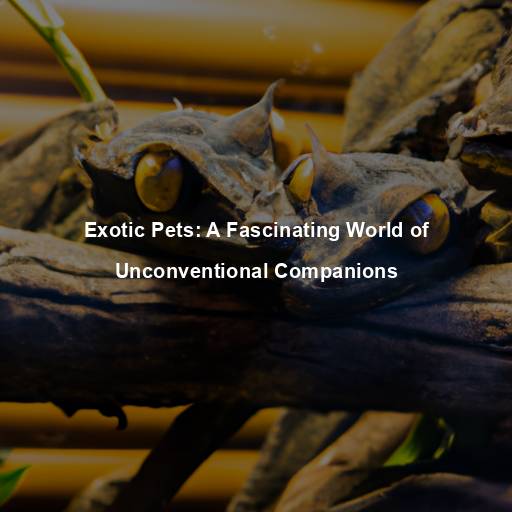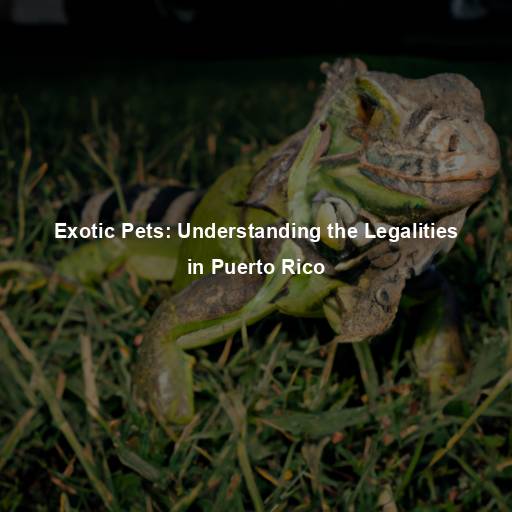The Best Exotic Pets You Can Own: A Comprehensive Guide
Last Updated on July 20, 2023 by Evan
Contents [hide]
- 1 Understanding Exotic Pets
- 1.1 What Defines an Exotic Pet?
- 1.2 The Appeal of Exotic Pets
- 1.3 Legal Considerations
- 1.4 Choosing the Right Exotic Pet for You
- 1.5 Exotic Pet Care and Maintenance
- 1.6 The Ethical Considerations of Exotic Pet Ownership
- 1.7 Exotic Pet Health and Veterinary Care
- 1.8 Exotic Pets and Children: Considerations and Safety
- 1.9 Exotic Pet Longevity and Lifespan
- 1.10 The Role of Exotic Pet Rescues and Sanctuaries
- 1.11 Exotic Pet Education and Advocacy
- 1.12 The Joy and Challenges of Exotic Pet Ownership
- 2 FAQs: Best Exotic Pets You Can Own
- 2.1 What are some of the best exotic pets that can be owned?
- 2.2 Are exotic pets suitable for everyone?
- 2.3 What are the advantages of owning an exotic pet?
- 2.4 Do exotic pets require specialized veterinary care?
- 2.5 Can exotic pets be easily trained?
- 2.6 Are exotic pets legal to own everywhere?
- 2.7 What are some common misconceptions about owning exotic pets?
Understanding Exotic Pets
There’s something undeniably alluring about the idea of sharing our homes with extraordinary creatures. Exotic pets, with their vibrant colors and enchanting behaviors, offer us a gateway into a world that is both wild and captivating. However, before we embark on this journey, it’s important to embrace the responsibilities and complexities that come with it. In this extensive guide, we will delve into the realm of exotic pets, exploring their diverse species, care requirements, and the legal intricacies that surround them.
What Defines an Exotic Pet?
Have you ever considered welcoming a creature of the extraordinary into your home? Exotic pets, a captivating array of unconventional animals, disrupt the status quo of domestic companionship. Among their ranks, you’ll find reptiles, amphibians, birds, small mammals, and even spineless wonders. Originating from far-flung corners of the globe, these captivating creatures possess distinct attributes and needs that challenge the norms of traditional pet ownership, leaving behind the realm of canines and felines.
The Appeal of Exotic Pets
There’s something undeniably enchanting about welcoming an exotic pet into your life. Their mere presence is like a kaleidoscope of wonderment, a burst of vibrant colors and intriguing patterns that awakens the dormant explorer within us. Observing their peculiar behaviors is like unwrapping a puzzle, each movement a perplexing piece that begs to be deciphered. As these magnificent creatures grace our homes, they become our loyal companions, forging an unspoken bond that leaves us feeling both comforted and amazed.
Legal Considerations
Before embarking on the exciting journey of owning an exotic pet, it is imperative to navigate the labyrinth of legal formalities that govern their ownership. These regulations, much like a patchwork quilt, differ from country to country and state to state, rendering the process a perplexing maze for aspiring exotic pet parents. It is of utmost importance to vigorously delve into researching and comprehending the intricate web of laws that dictate the ownership, importation, and transportation of these captivating creatures in your particular area. Only through such diligent efforts can you ensure a harmonious existence for both these extraordinary animals and the humans who are irresistibly drawn to their allure.
Choosing the Right Exotic Pet for You
Choosing the perfect exotic pet is like navigating a labyrinth of possibilities. From feathery critters to slithery companions, the options are as diverse as the Amazon rainforest. However, treading this untamed territory requires careful consideration of your own habitat and lifestyle. Are you a bustling city dweller or a nature-loving recluse?
Reptiles
It’s no secret that reptiles have slipped their way into the hearts of exotic pet enthusiasts all over. From slithering snakes to scaly lizards and even the humble turtles, these creatures offer an array of species that captivate the imagination. But here’s the perplexing part – each reptile comes with its own unique set of care requirements, throwing even the most experienced pet owners into a state of bewilderment. Take, for instance, the leopard gecko or ball python, which are hailed as low-maintenance champs that can flourish within the confines of a well-designed terrarium.
Birds
For ages, birds have captivated our hearts with their mesmerizing feathers, astonishing wit, and uncanny ability to mimic our very own voices. Yet, let’s not forget that these feathery companions demand more than just admiration. Owning a bird entails a labyrinth of responsibilities, demanding both our time and unwavering attention. When considering a charming addition to your household, exotic bird pets like parrots, cockatoos, and macaws often top the list.
Small Mammals
In recent years, a surge in popularity has been observed for petite yet captivating creatures like sugar gliders, hedgehogs, and ferrets. These delightful additions to our lives offer a distinctive connection and prove to be a suitable choice for those unable to accommodate larger companions. It is crucial, however, to grasp their peculiar gastronomic requirements, prioritize their daily dose of physical activity, and establish a nurturing atmosphere where safety and stimulation intertwine harmoniously to safeguard their overall welfare.
Exotic Pet Care and Maintenance
Once you have chosen the perfect exotic pet, it is crucial to provide them with the proper care and maintenance they require. This includes creating an appropriate habitat, offering a balanced diet, providing mental and physical stimulation, and regular veterinary check-ups. Exotic pets often have specialized dietary needs and environmental requirements that must be met to ensure their health and well-being.
Habitat Setup
Creating an ideal living environment for exotic pets is crucial for their overall health and happiness. It is essential to thoroughly research and comprehend their specific habitat requirements. This may entail constructing a suitable enclosure with precise provisions for temperature, humidity levels, lighting, and substrate. The aim is to closely replicate their natural habitats, ensuring utmost comfort and well-being.
Proper Nutrition
Ensuring the optimal well-being of our beloved exotic companions necessitates a meticulous approach to their nutritional sustenance. These intriguing creatures boast intricate dietary demands that warrant our attention and comprehension. From the captivating species that seek live prey for sustenance, to those that flourish on a splendid fusion of crisp fruits, verdant vegetables, and specialized commercial fare, catering to their individualized preferences is paramount. It is prudent to engage with seasoned exotic pet enthusiasts or consult with discerning veterinarians to glean invaluable wisdom on the intricate art of satiating the gastronomic desires of our chosen companions.
Enrichment and Socialization
In the magnificent world of unique companions, creatures of the exotic variety are known for their innate need for both mental and physical escapades, just like their wild counterparts. A delightful harmony can be achieved through the art of enrichment activities that tantalize their senses, foster curiosity, and grant them the thrill of exploration. Toys, puzzles, and delightful escapades, carefully curated to satisfy their curious whims, are the key to unlocking the gates of perpetual amusement and ensuring their holistic well-being. But pause for a moment, dear reader, for there is a secret to unlocking their true contentment – the undeniable yearning for social bonds, woven into the very fabric of being for wondrous beings such as birds and small mammals.
The Ethical Considerations of Exotic Pet Ownership
Owning an exotic pet can undoubtedly bring a surge of delight and forge a unique bond, but let’s dive into the complex realm of ethics surrounding this often perplexing practice. We must confront the disconcerting reality that the exotic pet trade often fuels the illicit trafficking of endangered species, causing irreparable harm to precious ecosystems. Therefore, conscientiousness becomes paramount in selecting an exotic pet, ensuring it is sourced through legal and ethical means. Embracing responsible breeders, closely mulling over adoption options from reputable rescue organizations, or even exploring alternative ways to appreciate exotic animals, like taking a trip to sanctuaries or wildlife rehabilitation centers, all align with ethical standards and promote a more harmonious relationship with these captivating creatures.
Exotic Pet Health and Veterinary Care
Ensuring the health and well-being of your exotic pet is of utmost importance. Regular veterinary check-ups are essential to detect any potential health issues and provide appropriate care. Finding a veterinarian with experience in treating exotic animals is crucial, as their medical needs can differ significantly from traditional pets. It is also important to be aware of common health concerns associated with your chosen exotic pet and take preventive measures to minimize the risk of illness or injury.
Preventive Care
Ensuring the well-being of your beloved exotic pet demands a focused stance on preventive care. The cornerstone lies in embracing regular vaccinations, controlling pesky parasites, and embarking on routine check-ups. Moreover, the adage “health is wealth” holds true when supplying a spotless sanctuary, nourishing sustenance, and a consistent exercise regimen— all pivotal in warding off potential health complications.
Emergency Care
When it comes to handling unexpected incidents or unforeseen health issues concerning our beloved exotic pets, being caught off guard is the last thing we want. Acknowledging the sheer complexity and distinctive nature of these animals, it becomes imperative to proactively establish a concrete plan of action for accessing emergency veterinary care. By ensuring that we have access to the contact information of specialized veterinarians catering specifically to exotic animals, we equip ourselves with the necessary tools to navigate the perplexing realm of their unique physiology. Promptness and preparedness play pivotal roles in determining the best possible outcome for our treasured exotic companions during critical situations.
Exotic Pets and Children: Considerations and Safety
If you have children or are planning to introduce an exotic pet into a household with children, there are important considerations to keep in mind. While exotic pets can provide educational opportunities and companionship for children, it is crucial to prioritize safety and ensure that interactions between children and exotic pets are supervised and age-appropriate.
Education and Supervision
Educating children about the specific needs and behaviors of exotic pets is essential to promote a safe and positive environment for both the child and the animal. Supervision during interactions is crucial to prevent accidental harm to the pet and to teach children appropriate handling and care techniques.
Allergies and Sensitivities
Some children may have allergies or sensitivities to certain types of exotic pets, such as birds or reptiles. It is important to be aware of any potential allergies within the household and take necessary precautions to minimize exposure or consider alternative pets that are hypoallergenic.
Exotic Pet Longevity and Lifespan
The lifespan of an exotic pet can vary significantly depending on the species. It is important to consider the potential longevity of the pet you choose and be prepared for the commitment it entails. Some exotic pets, such as certain species of parrots or tortoises, can live for several decades or even longer. Understanding the potential lifespan of your chosen pet allows you to plan for their care throughout their entire life.
The Role of Exotic Pet Rescues and Sanctuaries
In a world where the whimsical allure of exotic pets often masks a darker reality, the tireless efforts of rescues and sanctuaries stand as a testament to compassion and redemption. With their unwavering commitment to provide solace for those creatures forsaken by their human companions, these havens of hope serve as a ray of light in an otherwise perplexing landscape. As advocates for ethical practices, lending a helping hand to these noble establishments, whether through donations, volunteering, or even adoption, can unleash a tidal wave of transformation, ensuring the well-being and happiness of these remarkable beings.
Exotic Pet Education and Advocacy
Being a responsible exotic pet owner goes beyond just having the right equipment and proper care. It requires a commitment to education and advocacy, a way to understand the complex needs and conservation challenges faced by these majestic creatures. By staying on top of the latest information and actively participating in educational programs, we can make a tangible difference in their preservation efforts. Additionally, supporting organizations that are dedicated to raising awareness about exotic pet ownership and sharing our knowledge within our community can lead to a more responsible and compassionate approach towards these species.
The Joy and Challenges of Exotic Pet Ownership
The allure of exotic pets knows no bounds, as the mere thought of basking in the company of extraordinary creatures brings a rush of excitement and a profound sense of fulfillment. The potential for a bond, so inexplicably magical, between humans and these awe-inspiring animals is truly perplexing in the best possible way. Yet, in the midst of this enchantment, one mustn’t ignore the jagged path that exotic pet ownership presents. It demands unwavering dedication, an abundance of time and resources, and an insatiable thirst for knowledge about the specific needs of these captivating creatures.
FAQs: Best Exotic Pets You Can Own
What are some of the best exotic pets that can be owned?
Discover an array of captivating companions that will leave you speechless. Curious about the extraordinary? Look no further than the enchanting world of exotic pets. From adorable sugar gliders to spiky hedgehogs and mischievous ferrets, these small mammals will unravel the mysteries of companionship with their playful nature. If reptiles tickle your fancy, embrace the wonder of leopard geckos, bearded dragons, and ball pythons, as they astound with their unique care requirements and captivating charm. Dive into the enigmatic realm of exotic pets and let your imagination run wild.
Are exotic pets suitable for everyone?
Exotic pets have specific needs and requirements that may not be suitable for everyone. They often demand a higher level of care, specialized diets, and unique living conditions compared to more traditional pets like cats or dogs. It is crucial to thoroughly research the specific needs of the exotic pet you are considering and honestly assess your ability to meet those requirements before making a decision. Additionally, local laws and regulations regarding exotic pets should be carefully considered before bringing one into your home.
What are the advantages of owning an exotic pet?
Having an exotic pet is truly a one-of-a-kind journey filled with wonder and intrigue. These captivating creatures boast an array of captivating behaviors and striking physical characteristics that will leave you in awe. Indulging in the world of exotic pets grants a remarkable opportunity to delve into the depths of diverse species and their natural habitats, expanding your understanding of the animal kingdom. Beyond their enigmatic allure, these remarkable beings can also forge profound connections with their caregivers, offering unwavering companionship and a deep sense of purpose. Explore the uncharted territory of exotic pets and embark on an adventure of a lifetime.
Do exotic pets require specialized veterinary care?
Yes, exotic pets generally require specialized veterinary care. Regular check-ups with a veterinarian experienced in exotic animal medicine are essential to ensure the pet’s health and well-being. Exotic animals have specific medical needs that may differ significantly from those of traditional pets. It is important to find a vet who specializes in exotic pets and can provide appropriate care and advice tailored to the specific species you own.
Can exotic pets be easily trained?
The trainability of exotic pets can vary depending on the species, but some can be trained to a certain extent. It is important to understand the natural behaviors and instincts of the animal before attempting to train them. Positive reinforcement techniques and consistency are usually effective when training exotic pets. However, some species may not be as trainable as others, and it is important to respect their individuality and provide appropriate outlets for their natural behaviors and instincts.
Are exotic pets legal to own everywhere?
The world of exotic pets is a labyrinth of legality, where rules and regulations seem to change like the seasons. Navigating this complex terrain can be an endeavor shrouded in bewilderment, as each country, region, and even state dances to its own unique legislative melody. The obscure symphony of laws surrounding exotic pet ownership demands a diligent effort in research and comprehension, lest one stray into forbidden territory. For in this tangled web of legalities, one may find themselves entangled in the thorny embrace of strict restrictions or be banished altogether from the exotic pet kingdom. Thus, to ensure a harmonious coexistence with these extraordinary creatures, one must heed the call to familiarize oneself with the enigmatic tapestry of local regulations, for legality and ethics shall intertwine inextricably.
What are some common misconceptions about owning exotic pets?
There are a few common misconceptions about owning exotic pets that should be addressed. Firstly, some people may assume that all exotic pets are dangerous or aggressive. While it is true that certain exotic species possess unique characteristics or have specific care requirements, not all exotic pets pose a threat. Secondly, there is a misconception that exotic pets are low-maintenance and require less attention compared to traditional pets. In reality, many exotic pets demand specialized care, handling, and nutrition, which may require a significant investment of time and resources. It is important to understand and dispel these misconceptions before deciding to own an exotic pet.







